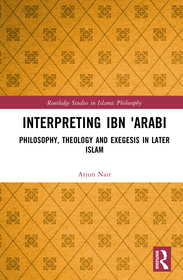
Interpreting Ibn ʿArabī
Philosophy, Theology, and Exegesis in Later Islam
Series: Routledge Studies in Islamic Philosophy;
- Publisher's listprice GBP 145.00
-
69 273 Ft (65 975 Ft + 5% VAT)
The price is estimated because at the time of ordering we do not know what conversion rates will apply to HUF / product currency when the book arrives. In case HUF is weaker, the price increases slightly, in case HUF is stronger, the price goes lower slightly.
- Discount 10% (cc. 6 927 Ft off)
- Discounted price 62 346 Ft (59 378 Ft + 5% VAT)
Subcribe now and take benefit of a favourable price.
Subscribe
69 273 Ft

Availability
Not yet published.
Why don't you give exact delivery time?
Delivery time is estimated on our previous experiences. We give estimations only, because we order from outside Hungary, and the delivery time mainly depends on how quickly the publisher supplies the book. Faster or slower deliveries both happen, but we do our best to supply as quickly as possible.
Product details:
- Edition number 1
- Publisher Routledge
- Date of Publication 29 December 2025
- ISBN 9781041091271
- Binding Hardback
- No. of pages260 pages
- Size 234x156 mm
- Language English 700
Categories
Short description:
Interpreting Ibn ʿArabī: Philosophy, Theology and Exegesis in Later Islam offers a comprehensive and critical examination of one of Islam’s most enigmatic and influential thinkers.
MoreLong description:
Ibn ʿArabī (d. 638/1240) is perhaps the most challenging intellectual figure of later Islamic history, being at once highly celebrated and highly vilified. This book explores an interpretive and commentary tradition around his controversial ideas.
MoreTable of Contents:
Acknowledgments
Note on Transliteration and Translation
Introduction
The Problems (mushkilāt) of the Fuṣūṣ: Interpretive Divergences
From the Lack of Understanding (ʿadam al-fahm): Solving the Problems of the Fuṣūṣ
The Present Study: Interpreting Ibn ʿArabī
1 “All is He, All is Not He”: The Vision of Huwa-lā Huwa
The Entities (aʿyān) are Not Made (ghayr majʿūl) and Non-Existent (maʿdūm)
The Mirror-Entities and the Color-Entities
The Pre-Existent Forms (ṣuwar) of the Entities: The Cloud, the Barzakh, the Creator-Real
2 Divine Power and Human Freedom
The Essence (Dhāt) and the Divinity (Ilāh), Determination (taqdīr) and Creation (khalq)
Freedom and Compulsion, Responsibility (taklīf) and Predestination (qadar)
3 Incomparability and Similarity
To Affirm Incomparability is to Affirm Limitation (taḥdīd) and Restriction (taqyīd)
Transcending the God of Beliefs (al-ilāh al-muʿtaqadāt)
The Divinity Clothed in Forms of Belief: Worshiping the Idols of Belief
4 “Created in his/His Form”: The All-Comprehensive Form of Man
Originated and Beginningless (ḥādith azalī), Perpetual and Endless (dāʾim abadī)
The Problem of Man’s Firstness (awwaliyya)
Creation (khalaqa) in Two Senses: Determination (taqdīr) and Existentiation (ījād)
5 Becoming a Form of God (ṣūrat al-Ḥaqq)
The False Form (ṣūra bāṭila) of the Pharaoh of Moses (Firʿawn Mūsā)
The Form of al-Kharrāz, One of the Tongues of God (lisān min alsinat al-Ḥaqq)
6 The Messenger takes his Knowledge from the Seal of the Saints
The Prophets (anbiyāʾ) in the Fuṣūṣ al-ḥikam
The Seal of the Saints: “the space for two bricks” (mawḍiʿ labinatayn)
7 Interpreting the Qurʾān
Between taʾwīl, ishāra, and ʿubūr: Ibn ʿArabī’s Qurʾānic Hermeneutics
Abraham’s Sacrifice (dhabḥ), God’s Deception (makr), Drowning in Knowledge
8 The Hermeneutics of Mercy
The Faith of Pharaoh (īmān Firʿawn) in Q. 10:90-92
From Torments (ʿadhāb) to the Sweetness of Torments (ʿudhūba)
Conclusion: Interpreting the Shaykh al-Akbar
“He/not He” Revisited: Ambiguity and Knowledge as Perplexity (ḥayra)
“He who does not know the status of imagination has no knowledge”
Bibliography
Index
More




